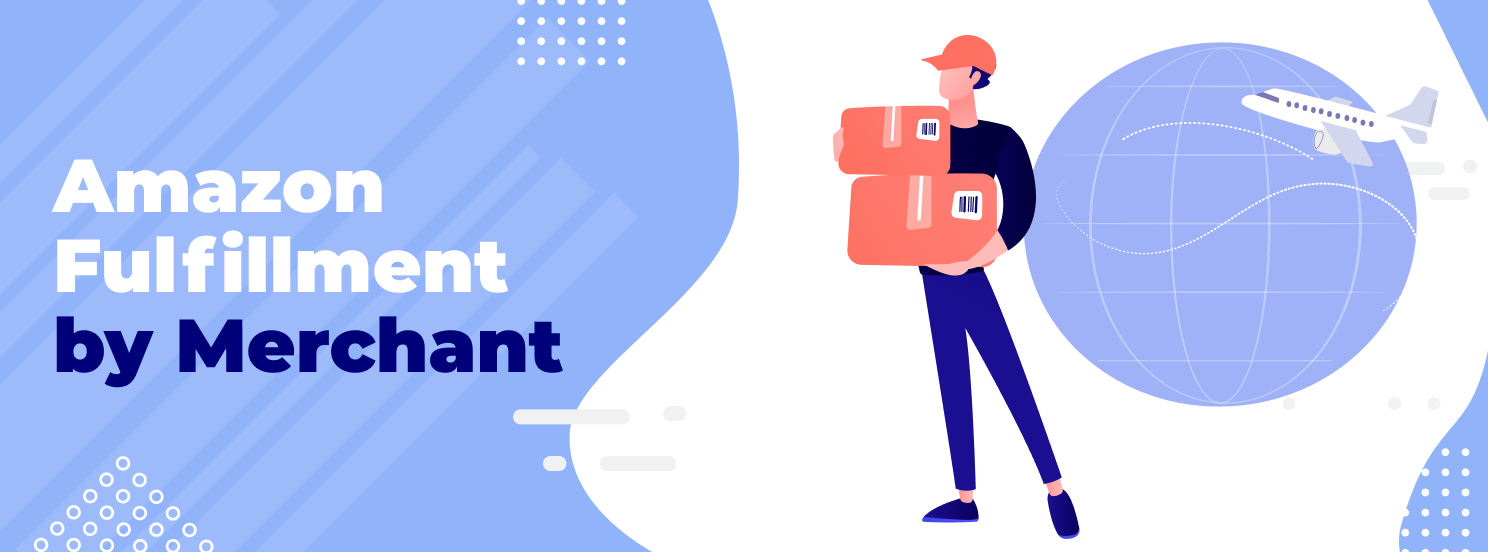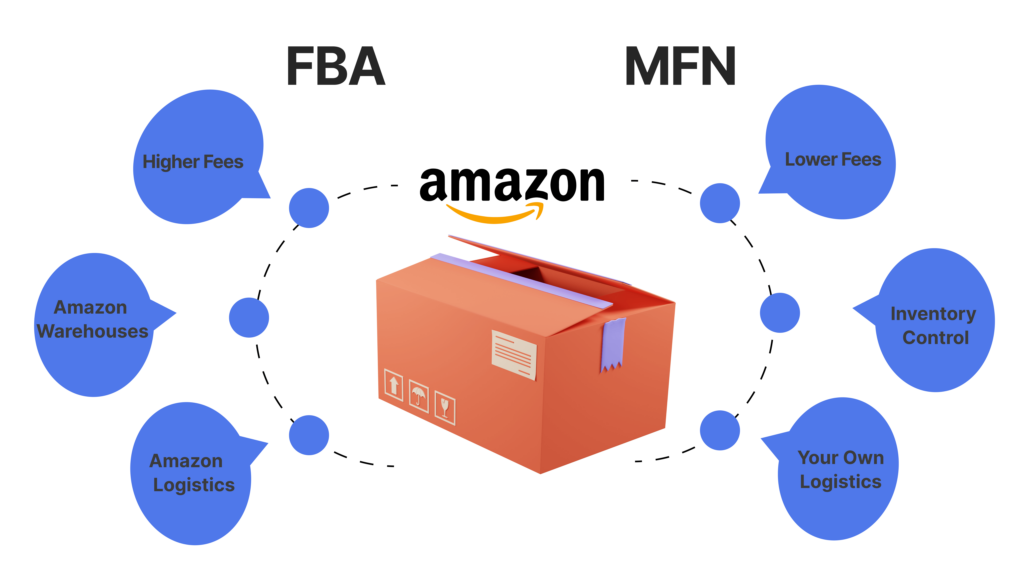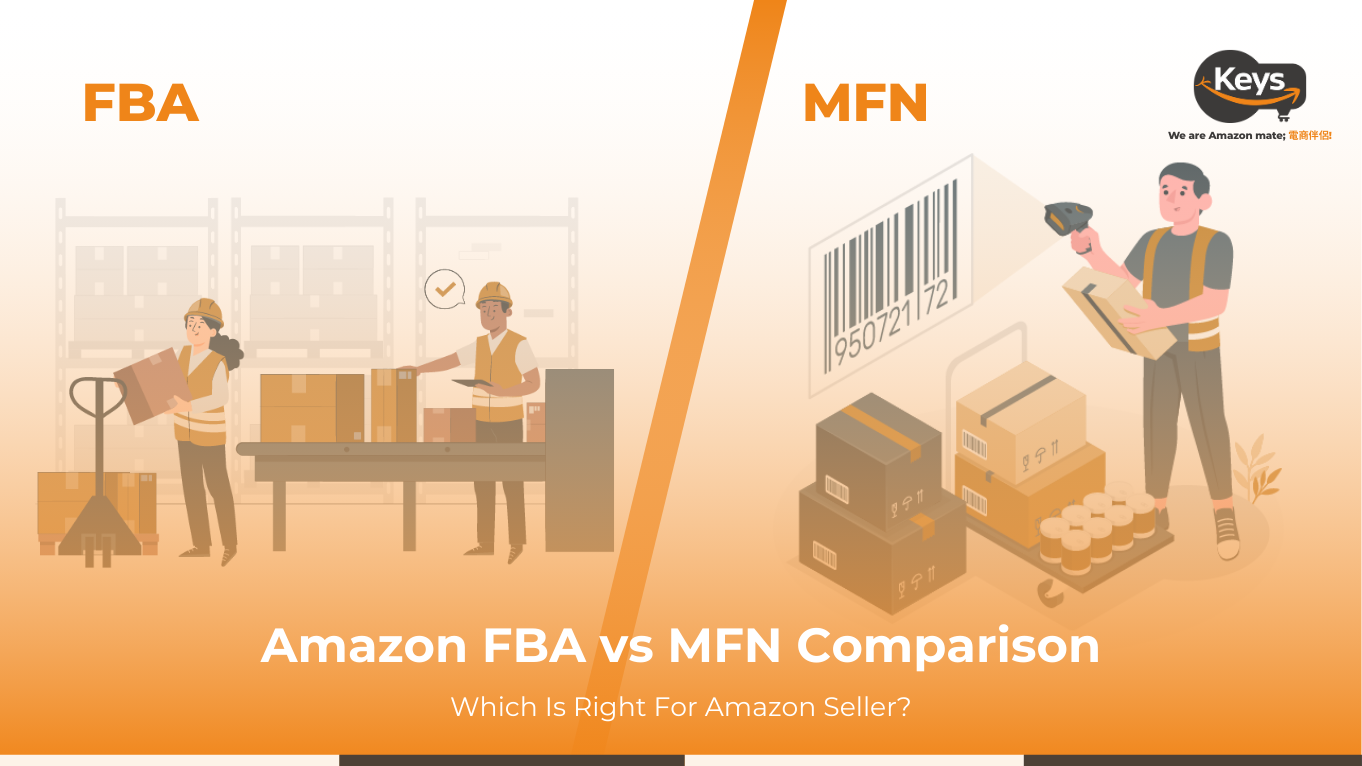Choosing between Fulfillment by Amazon (FBA) and Merchant Fulfilled Network (MFN) is a critical decision for online sellers aiming to scale effectively. Each model offers unique advantages depending on your business size, logistics capabilities, and goals. In this guide, we’ll break down FBA vs MFN in terms of cost, control, and performance to help you find the best fit. Understanding the pros and cons will ensure your fulfillment strategy aligns with your long-term growth.
What are Amazon FBA and MFN?
In the sections below, we’ll define both FBA and MFN to help you determine which aligns best with your business operations:
FBA

FBA is a service provided by Amazon that allows sellers to store their products in Amazon’s fulfillment centers. When a customer places an order, Amazon handles the entire fulfillment process, including picking, packing, shipping, and customer service. This service offers several advantages, such as access to Amazon Prime customers, streamlined logistics, and enhanced visibility in search results. However, sellers incur various fees, including storage and fulfillment costs, which can impact profit margins, especially for slow-moving inventory.
MFN
MFN, also known as Fulfilled by Merchant (FBM), refers to a fulfillment method where sellers manage the storage, packing, and shipping of their products directly from their own facilities. This approach allows sellers to retain control over their inventory and fulfillment processes, potentially leading to cost savings and customization opportunities. However, MFN sellers are responsible for customer service and returns, which can be time-consuming. Additionally, products fulfilled through MFN do not qualify for Amazon Prime, which may limit visibility and sales potential compared to FBA listings.

FBA vs MFN: Pros & Cons
When deciding between Fulfillment by Amazon and Merchant Fulfilled Network, it is essential to weigh the advantages and disadvantages of each fulfillment method. Here’s a concise overview:
FBA: Pros & Cons
Pros:
- Prime eligibility: FBA products are automatically eligible for Amazon Prime, increasing visibility and sales potential, as many customers prefer Prime listings.
- Hassle-free fulfillment: Amazon handles storage, packing, shipping, customer service, and returns, allowing sellers to focus on other aspects of their business.
- Access to Amazon’s Logistics Network: Sellers benefit from Amazon’s efficient shipping and distribution network, which can lead to faster delivery times.
Cons:
- Costly fees: FBA incurs various fees, including storage and fulfillment costs, which can significantly impact profit margins, especially for slow-moving items.
- Limited control: Sellers have less control over the fulfillment process, including packaging and shipping methods, which may not align with their brand standards.
- Long-Term storage fees: Products that remain in FBA warehouses for extended periods may incur additional long-term storage fees, further affecting profitability.
MFN: Pros & Cons
Pros:
- Cost control: Sellers can save on storage and fulfillment fees by managing their own logistics, which can lead to higher profit margins.
- Customization: MFN allows for personalized packaging and customer interactions, enhancing the overall customer experience.
- Full control: Sellers maintain complete control over their inventory and fulfillment processes, enabling them to implement their own shipping strategies.
Cons:
- Increased Responsibility: Sellers are responsible for all aspects of fulfillment, including shipping, customer service, and handling returns, which can be time-consuming.
- No Prime Badge: Products fulfilled through MFN do not qualify for Amazon Prime, potentially limiting visibility and sales compared to FBA listings.
- Performance Pressure: Maintaining high service levels is crucial, as poor performance can lead to negative customer feedback and reduced sales.

How do Amazon sellers benefit from using FBA vs. MFN?
Amazon sellers can benefit from both Fulfillment by Amazon and Merchant Fulfilled Network, depending on their operational goals and resources. Sellers who prioritize convenience, scalability, and access to Prime customers often choose FBA, as it reduces the burden of logistics and enhances buyer trust through Amazon’s branding. This is especially beneficial for high-volume sellers or those targeting fast-moving consumer goods.
On the other hand, MFN empowers sellers who value flexibility and brand identity. By managing their own storage and shipping, MFN sellers can implement custom packaging, negotiate their own carrier rates, and maintain full oversight of the customer journey. This model is particularly advantageous for niche sellers or those with specialized logistics systems already in place.
What are the differences between FBA & MFN?
FBA and MFN are two distinct fulfillment methods available to Amazon sellers, each with its own set of features, advantages, and disadvantages. Below is a comparison highlighting the key differences between FBA and MFN:
| Criteria | FBA | MFN |
| Fulfillment Responsibility | Amazon handles all aspects of fulfillment, including storage, packing, shipping, and customer service. | Sellers manage their own inventory, packing, shipping, and customer service. |
| Prime Eligibility | Products fulfilled through FBA are automatically eligible for Amazon Prime, enhancing visibility and sales potential. | MFN products do not qualify for Prime, which may limit exposure to Prime customers. |
| Control Over Branding | Limited control over packaging and branding, as Amazon standardizes the fulfillment process. | Greater flexibility in packaging and branding, allowing for personalized customer experiences. |
| Logistics Network | Access to Amazon’s extensive logistics network, resulting in faster shipping times and improved customer satisfaction. | Sellers must manage their own logistics, which can be more time-consuming but allows for tailored shipping options. |
| Returns Management | Amazon handles returns for FBA products, simplifying the process for sellers. | Sellers are responsible for managing returns, which can be more labor-intensive. |
Amazon FBA vs MFN costs
When comparing the costs associated with Fulfillment by Amazon and Merchant Fulfilled Network, it is essential to understand the different fee structures and potential expenses involved in each fulfillment method.
FBA costs:
- Fulfillment fees: FBA sellers incur fees based on the size and weight of their products. These fees cover picking, shipping, packing and customer service. The costs can vary significantly depending on the product dimensions and weight.
- Storage fees: Amazon charges monthly storage fees for the space your products occupy in their fulfillment centers. These fees are calculated per cubic foot and can increase during peak seasons. Additionally, long-term storage fees apply to items stored for over 365 days, which can further impact profitability.
- Additional costs: Sellers may also face costs for services such as labeling, packaging, and removal of inventory. These additional fees can accumulate, especially for sellers with large inventories or specific packaging requirements.
MFN costs:
- Shipping costs: MFN sellers are responsible for their own shipping expenses, which can vary based on the shipping method and carrier chosen. This flexibility allows sellers to negotiate better rates or choose cost-effective shipping options.
- No storage fees: Unlike FBA, MFN sellers do not incur storage fees since they manage their own inventory. This can lead to significant savings, particularly for sellers with slow-moving products.
- Operational costs: Sellers using MFN must account for the costs associated with managing their own logistics, including packaging materials, labor for packing and shipping, and customer service operations. While these costs can be lower than FBA fees, they require more hands-on management.
Which is better for Amazon sellers: FBA or MFN?
The better choice between FBA and MFN depends on your business goals, logistics capacity, and desired level of control. FBA is ideal for sellers who want to scale quickly, access Prime customers, and offload fulfillment to Amazon-making it great for high-volume, fast-moving products. MFN, on the other hand, suits sellers who prefer to manage their own logistics, reduce fulfillment costs, and maintain brand control through customized packaging and shipping.
For sellers with strong in-house operations or third-party logistics (3PL) support, MFN offers greater flexibility. Meanwhile, FBA simplifies fulfillment but comes with higher fees and limited customization.

Simplify FBA/MFN: Fast, Efficient, and Affordable with Keys Logistics
Keys Logistics is a global fulfillment provider with years of experience supporting ecommerce businesses of all sizes – from startups to enterprise brands. We process over 10 million orders annually with a 99.5% on-time delivery rate, powered by our smart fulfillment system and strategic warehouses in Ontario (USA), the UK, and Germany. Our integrated platform connects seamlessly with Amazon, Shopify, eBay, TikTok Shop, and more, enabling real-time inventory tracking and streamlined order management.
With partnerships across 500+ global carriers, including UPS, FedEx, and DHL, we help sellers optimize both FBA and MFN models through customized packing, labeling, and scalable shipping solutions. Our 24/7 customer service ensures smooth operations and quick issue resolution. Whether you’re managing your own fulfillment or leveraging Amazon’s infrastructure, Keys Logistics provides the flexibility, speed, and reliability your business needs to grow.
In conclusion, understanding the nuances of FBA vs MFN is crucial for Amazon sellers aiming to optimize their fulfillment strategies. Each method offers distinct advantages and challenges, making it essential for sellers to evaluate their specific needs and operational capabilities. By leveraging the right fulfillment option, businesses can enhance efficiency, reduce costs, and improve customer satisfaction. For tailored solutions that simplify your FBA and MFN processes, contact us at Keys Logistics today!












 Tiếng Việt
Tiếng Việt 中文 (中国)
中文 (中国)

